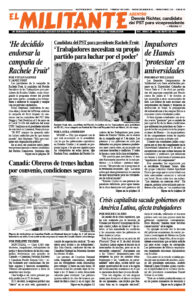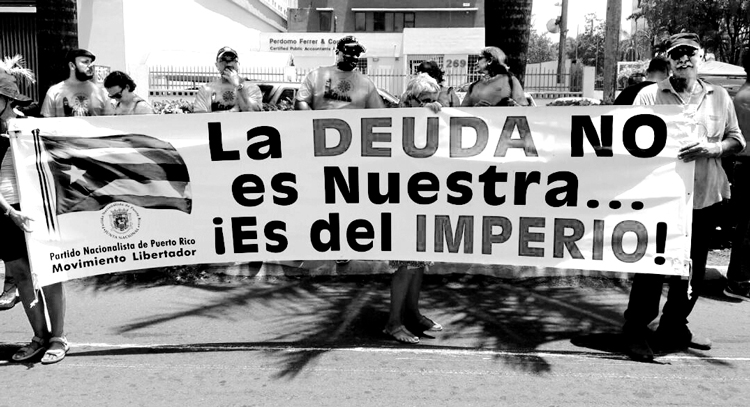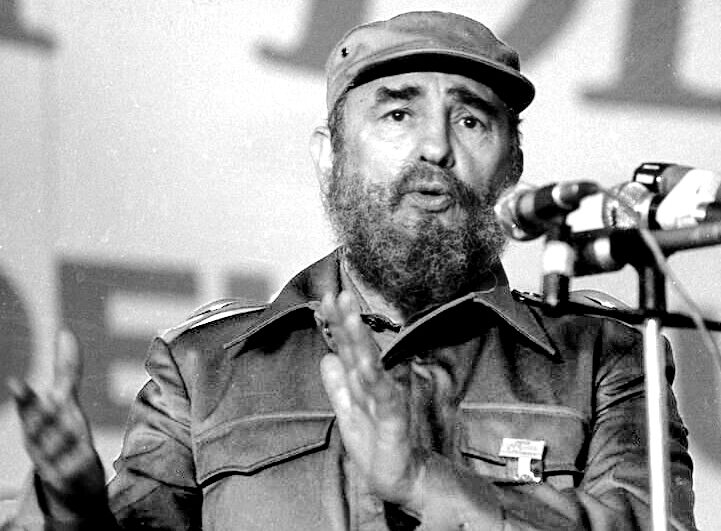Fidel Castro Speeches 1984-85: War and Crisis in the Americas is one of Pathfinder’s Books of the Month for May. At a time when a new debt crisis is looming, we publish extracts from two interviews Cuban President Fidel Castro gave as part of a widening campaign among Latin American governments to unite and demand cancellation of the foreign debt of countries oppressed by imperialism. The first excerpt is from “The political and social situation in Latin America is a powder keg,” given Feb. 13, 1985, to Spanish news agency EFE. The second is from “Latin America’s foreign debt must be canceled!” given March 21, 1985, to Mexican daily Excelsior. Copyright © 1985 by Pathfinder Press. Reprinted by permission.
BY FIDEL CASTRO
[T]he debt that these countries and all other Latin American countries have is unpayable. Our position is that it’s unpayable. This is my firm conviction.
[I]t’s not a question of renegotiating the debt, rescheduling it and providing terms of ten, twelve, and fourteen years with three-, four-, and five-year grace periods to pay the principal. The debt can be renegotiated and nothing at all will be solved. They can’t pay the interest, that’s the key point, they cannot pay the interest. …
Twenty-four years ago, [John F.] Kennedy promoted the Alliance for Progress as an antidote to prevent social convulsions, and undoubtedly the measures were imaginative. He proposed reforms and economic aid totalling $20 billion over several years to solve the problems of development and social problems.
The population is now twice as large as twenty-four years ago and the social problems have multiplied. The foreign debt is eighteen times greater than what Kennedy proposed as aid and the interest payments are $40 billion a year, $400 billion in ten years. So it’s not a matter of whether the countries want to pay the debt or the interest rates. It’s that they have no alternative; they cannot pay them. …
The danger is a complete political destabilization and social explosion. That’s what I say is going to occur if there’s an attempt to impose the IMF’s formulas and collect those interest payments.
* * *
[I]n just these four ways — because of our being charged extra for their products and being paid less for ours, compared to the situation in 1980; because of the artificially high interest rates, a consequence of United States monetary policy; because of the flight of capital; and because of the fact that we are paying with more expensive dollars, inflated ones, that have been overvalued — the Latin American countries’ economies were illegitimately stripped of more than $45 billion in 1984; $20 billion for the deterioration in trade relations, $10 billion for excessive interest, $10 billion for the flight of capital, and $5 billion (a conservative estimate) for the overvaluation of the dollar. Adding it all up, including what can be considered normal interest on the debt, in just one year the Latin American countries have turned values equal to around $70 billion over to the rich, developed world. …
[I]f, to this and to everything else I have already pointed out, you add the protectionist policies of the richest industrialized countries, plus the dumping and unfair competition with subsidized products which those same industrialized countries habitually engage in, how can you fail to understand the difficulties and the terrible crisis to which Latin America is now subjected? …
[I]t is simply impossible to pay the debt. It can’t be done from a practical standpoint — our economies couldn’t survive it — and it could never solve the problem of development. The debt is an economic and a political impossibility. It is also a moral impossibility. … Any attempt to pay the debt under the present social, economic, and political circumstances in Latin America would cost our suffering and impoverished nations rivers of blood, and it could never be done. Our peoples are not to blame for underdevelopment or for the debt. Our countries are not to blame for having been colonies; neocolonies; banana republics; or coffee, mining, or oil republics whose role was to produce raw materials, exotic products, and fuel at low cost and with cheap labor.
Economic specialists and historians tell us that the fabulous amounts of gold and silver that were extracted from the entrails of our nations and amassed over the centuries thanks to our peoples’ sweat and blood financed the development of the industrialized world that is now the creditor demanding payment of the debt. The amount wrenched away from our peoples in just the last few decades through unequal terms of trade, high interest rates, protectionism, dumping, monetary manipulations, and the flight of capital is much greater than the total amount of the debt. The riches and well-being of which we have been deprived through the imposition of economic dependence and underdevelopment cannot even be estimated, let alone measured. It is our peoples who, by right, are the creditors of the rich and industrialized Western world, both morally and materially.



